.

|
| HERE’S WHAT I’M READING |
‘In the summer holidays I could literally read from dawn to dusk,’ writes Lucy Mangan in her witty and highly engaging memoir of childhood reading, ‘Bookworm’ (Square Peg).
Lucy asks. ‘Do we ever manage again to commit ourselves as wholeheartedly and unselfconsciously as we do to the books we read when young?’ She is doubtful – and so am I. So I was delighted to see that ‘Girls Gone By’ have reprinted beautiful new editions of two, cracking reads from my childhood.
 Malcolm Saville was, after Enid Blyton, the biggest selling adventure story writer of his era. He is best known for his Lone Pine series, in which a group of children pledge to ‘be true to each other, whatever happens.’ My favourite Lone Pine adventure was, ‘Seven White Gates,’ (Girls Gone By) and re-reading this yarn has been a joy. The story just sweeps you along and it is packed with moonlight treks and life saving exploits (including an incredibly tense cable car finale) There are also some wonderful descriptions of the Shropshire countryside, as well as suitably detailed descriptions of mouth watering meals (always the sign of a great children’s book) It also has an unexpectedly moving finale – Saville at his very best. Malcolm Saville was, after Enid Blyton, the biggest selling adventure story writer of his era. He is best known for his Lone Pine series, in which a group of children pledge to ‘be true to each other, whatever happens.’ My favourite Lone Pine adventure was, ‘Seven White Gates,’ (Girls Gone By) and re-reading this yarn has been a joy. The story just sweeps you along and it is packed with moonlight treks and life saving exploits (including an incredibly tense cable car finale) There are also some wonderful descriptions of the Shropshire countryside, as well as suitably detailed descriptions of mouth watering meals (always the sign of a great children’s book) It also has an unexpectedly moving finale – Saville at his very best.
The three funniest writers when I was growing up were Richmal Crompton (Just William)) Anthony Buckeridge (Jennings) – and Jane Shaw. My criteria for this judgement was very simple – these were the three writers who made me laugh out loud. Jennings and Just William remain happily in print today – and, not before time, Jane Shaw is now returning to the bookshelves too with ‘Crooked Sixpence’ (Girls Gone by).
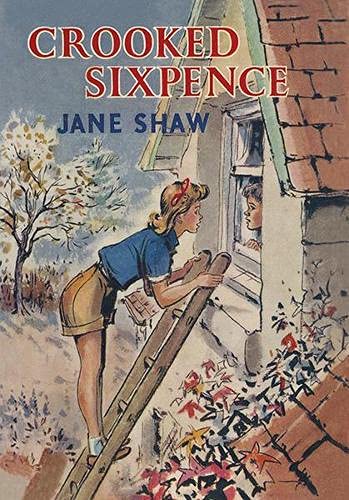 This is the sixth and final book about Penny, an unusual heroine, because she is shy and very unsure of herself. Her nervous, cautious character rang all sorts of bells for me. And I found myself cheering her on, as over the series, she begins to develop in confidence and resilience. She is aided by her reckless friend John, who becomes her cheerleader (and is a brilliantly drawn character) This is the sixth and final book about Penny, an unusual heroine, because she is shy and very unsure of herself. Her nervous, cautious character rang all sorts of bells for me. And I found myself cheering her on, as over the series, she begins to develop in confidence and resilience. She is aided by her reckless friend John, who becomes her cheerleader (and is a brilliantly drawn character)
Crooked Sixpence ably demonstrates Shaw’s highly individual humour - including her quick-witted dialogue. It is also a cleverly plotted mystery about the discovery of a Roman villa in a field near Bath, and is highly recommended.
Hayley Mills received rave reviews at the age of twelve for her portrayal of a frightened child witness, (the role was originally written for a boy) in ‘Tiger Bay.’ But she might have remained a one hit wonder if Walt Disney hadn’t spotted her potential and signed her to a six-film contract. Two years later she won an Oscar for her portrayal of ‘Pollyanna’ and she went on to star in some other huge hits both here and America, including ‘The Parent Trap,’ ‘Whistle Down the Wind’ and ‘The Family Way.’ She was also voted Britain’s biggest box office attraction.
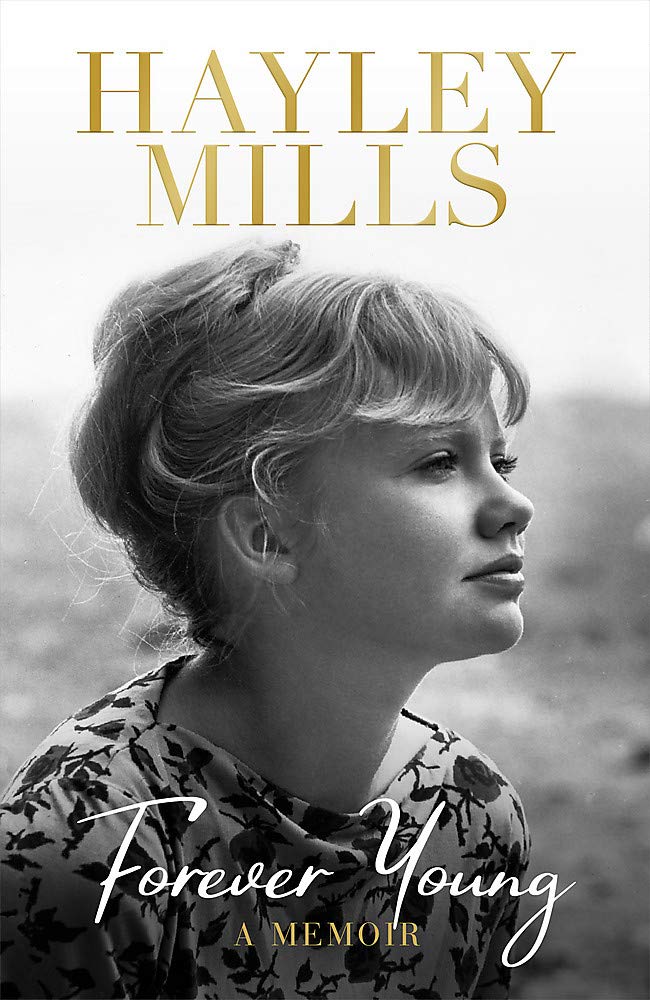 Now over half a century since those heady days Hayley Mills has written her memoir of that time, ‘Forever Young.’ This it is one of those rare books you can’t stop reading – affectionate and warm hearted (in true Pollyanna style she focuses on ‘glad things’) yet highly perceptive and honest too – not least about her first and fairly disastrous marriage to a man, over thirty years older than herself (the film director Roy Boulting) This is a book you find yourself still thinking about long after you have read it and could well be my autobiography of the year! Now over half a century since those heady days Hayley Mills has written her memoir of that time, ‘Forever Young.’ This it is one of those rare books you can’t stop reading – affectionate and warm hearted (in true Pollyanna style she focuses on ‘glad things’) yet highly perceptive and honest too – not least about her first and fairly disastrous marriage to a man, over thirty years older than herself (the film director Roy Boulting) This is a book you find yourself still thinking about long after you have read it and could well be my autobiography of the year!
After I last wrote about Golden Age crime writers, some of you got in contact to relate how you had started reading classic authors – especially Agatha Christie – during lockdown. You were gripped by the plots and savoured the battle of wits with the author – but the books also became a sanctuary from all the grim news.
A Golden Age author I have recently discovered – is Bruce Graeme. He was the author of over a hundred novels, and in his lifetime sold millions of copies. Moonstone Press have started reissuing his highly enjoyable series about a bookseller detective, Theodore Terhume, beginning with ‘Seven Clues in Search for a Crime’
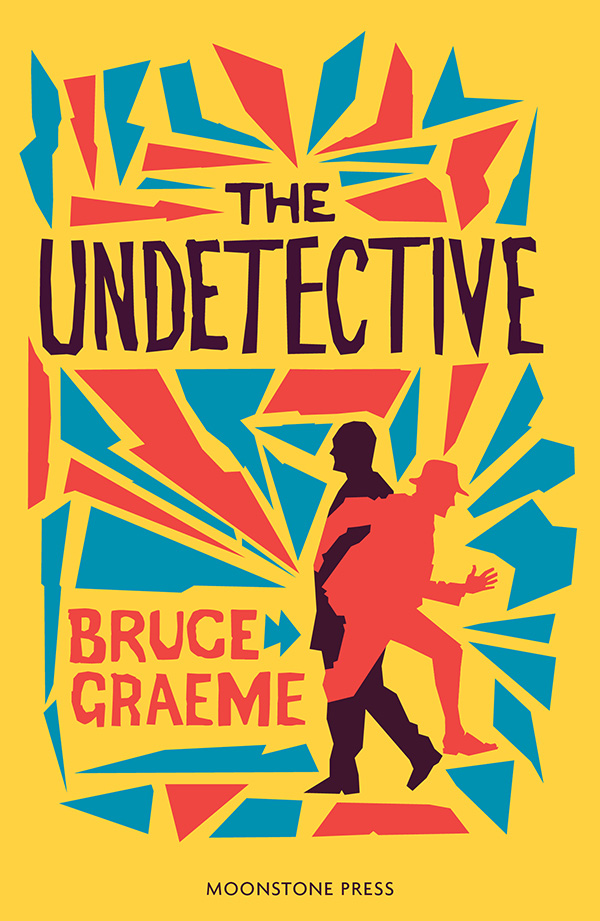 I would also recommend one of his later books, ‘The Undetective.’ (Moonstone) a brilliantly ingenious story about a mystery writer who writes under a pseudonym to protect the source of his insider knowledge about the police (his brother in law) His police procedural novel becomes a huge success but then things start to spin out of control – and he finds himself drawn into a real-life murder. Graeme keep us guessing just what is going on until the last pages with a fab final twist. It is also frequently very funny – notably with its satirical look at the publishing world. I would also recommend one of his later books, ‘The Undetective.’ (Moonstone) a brilliantly ingenious story about a mystery writer who writes under a pseudonym to protect the source of his insider knowledge about the police (his brother in law) His police procedural novel becomes a huge success but then things start to spin out of control – and he finds himself drawn into a real-life murder. Graeme keep us guessing just what is going on until the last pages with a fab final twist. It is also frequently very funny – notably with its satirical look at the publishing world.
Finally, one of my favourite TV shows is, ‘Inside No 9.’ A kind of modern day hybrid of ‘The Twilight Zone’ and ‘Tales of the Unexpected,’ and strikingly original in its own right. So I was delighted to obtain ‘Inside No 9,’ by Steve Pemberton and Reece Sheersmith. (The scripts series No 1 - 3) I really savoured these inventive masterclasses in story telling including the superb ‘The 12 Days of Christine.’ I hope a sequel featuring seasons 4-6 will swiftly follow. |
| |
THE BOOKS, FILMS AND TV SHOWS WHICH
ENTERTAINED ME DURING LOCKDOWN |
What a difficult year this has been, full of strangeness – I still can’t get used to seeing my hairdresser in a visor and mask and looking as if he’s escaped from an episode of Star Trek – and uncertainty. Never have we needed an escape route more … and books, films and TV programmes, are the perfect way to open a door to other lives and worlds.
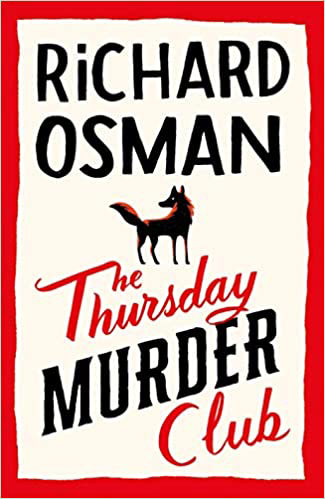 So firstly, here’s What I’ve been Reading… Just finished Richard Osman’s first thriller, ‘THE THURSDAY MURDER CLUB’ which is about four elderly sleuths investigating a local murder. It is engrossing and extremely likeable. I especially enjoyed the touches of wry humour, which I can hear Richard Osman saying. His book is in the great tradition of Golden Age crime stories. So firstly, here’s What I’ve been Reading… Just finished Richard Osman’s first thriller, ‘THE THURSDAY MURDER CLUB’ which is about four elderly sleuths investigating a local murder. It is engrossing and extremely likeable. I especially enjoyed the touches of wry humour, which I can hear Richard Osman saying. His book is in the great tradition of Golden Age crime stories.
There are novels where the emphasis is on mystery and characterisation rather than blood and gore. I am a huge fan and I have been re-reading Agatha Christie. Her novel, ‘THE HOLLOW’ is one of my special favourites, with interesting characters and bubbling with wit. (Christie could be extremely funny) While Hercule Poirot is on hand to bring the whole mystery to a very satisfying ending. I would also recommend two other Golden Age mysteries: THE BEAST MUST DIE by Nicholas Blake which has a truly memorable opening! ‘I am going to kill a man. I don’t know his name. I don’t know where he lives. I have no idea what he looks like. But I am going to find him and kill him.’ I defy anyone not to want to continue reading after that.
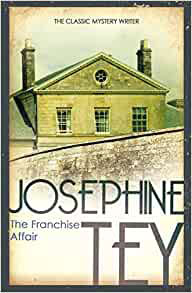 And THE FRANCHISE AFFAIR’ by Josephine Tey. No murder in this one, just a terrible accusation by a fifteen year old, against a rather mysterious mother and daughter. But it remains absolutely compelling because of Tey’s wonderful, insightful writing. This is a book which stays with you long after you’ve read it. One of my all-time favourites. And THE FRANCHISE AFFAIR’ by Josephine Tey. No murder in this one, just a terrible accusation by a fifteen year old, against a rather mysterious mother and daughter. But it remains absolutely compelling because of Tey’s wonderful, insightful writing. This is a book which stays with you long after you’ve read it. One of my all-time favourites.
Now, I’m often asked – do you still read children’s books? My reply is a resounding YES, re-reading both old favourites from my childhood and new titles often recommended by librarian friends, most recently, THE GIFTED, THE TALENTED AND ME,’ by William Sutcliffe, about a boy determined to stay true to his own averageness! Wickedly funny and so recognisable too.
WHAT I’M WATCHING...
FILMS
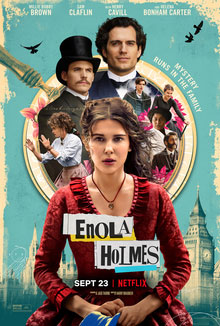 On NETFLIX. I enjoyed ENOLA HOLMES. Here the game’s afoot but from the perspective of Sherlock Holmes’s much younger sister Enola (Millie Bobby Brown) While investigating the mystery of her mother’s disappearance, Enola also helps a runaway young Lord (Louis Partridge) avoid a highly dangerous encounter. I think the whole family will enjoy this. The two young leads are great while Henry Cavill is thoughtful and intriguing as Sherlock Holmes and the pace never lets up. On NETFLIX. I enjoyed ENOLA HOLMES. Here the game’s afoot but from the perspective of Sherlock Holmes’s much younger sister Enola (Millie Bobby Brown) While investigating the mystery of her mother’s disappearance, Enola also helps a runaway young Lord (Louis Partridge) avoid a highly dangerous encounter. I think the whole family will enjoy this. The two young leads are great while Henry Cavill is thoughtful and intriguing as Sherlock Holmes and the pace never lets up.
Growing up in the 1970s, classic films were a key part of my TV viewing. Very sadly they have practically disappeared in recent years but now they are staging a comeback. The BBC have even started showing some real classics such as CASABLANCA and NORTH BY NORTHWEST at peak time on Thursday nights. These are films you can watch over and over and each time you will find something new.
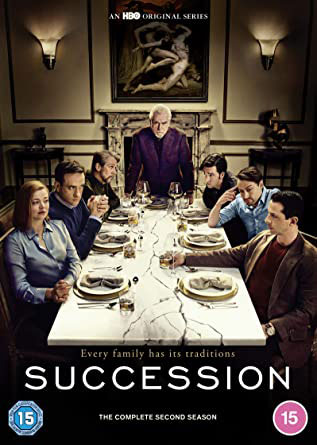 TV SHOWS TV SHOWS
My current favourite is the new version of ALL CREATURES GREAT AND SMALL – these timeless tales of vet James Herriot have been a TV highlight for millions – warm, funny – and definitely a return to gentler, kinder television. But I have also been enjoying – by way of total contrast – ‘SUCCESSION,’ Series 2. This is about a self-made billionaire (Brian Cox) and his four children who perpetually disappoint him! It’s DALLAS but without Bobby Ewing or Miss Ellie. Not one of the characters is remotely likeable but you can’t stop watching them and the writing is fabulous.
Also been enjoying Bob Mortimer and Paul Whitehouse’s GONE FISHING – (delighted there is to be a Season Four). DRAGON’S DEN; only repeats but still so gripping and ‘US’ a really good adaption of David Nicholls superb novel.
P.S.
‘Everyone is a bit scared,’ said the horse. ‘But we are less scared together,’ from ‘THE BOY, THE MOLE, THE FOX AND THE HORSE.’ by Charlie Mackesy. Still high on the best-seller charts and deservedly so – a book you can dip into anytime. Inspiring and charming. |
| |
EVERYTHING YOU WANTED TO KNOW ABOUT PETE |
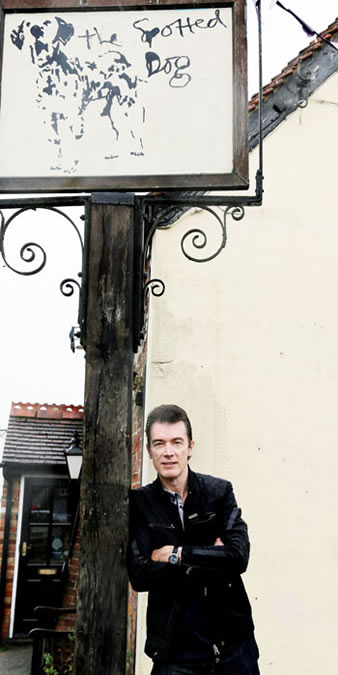 EYES – Blue EYES – Blue
HAIR COLOUR – Dark brown
HEIGHT – 6`3” Two favourite writers of mine were also tall – Oscar Wilde and Sir Conan Doyle, both 6’2” Not many people know that.
STAR SIGN – Taurus with Sagittarian rising – but maybe that’s too much information!
LEAST FAVOURITE TIME OF YEAR
Early January, when all the decorations have come down taking with them all the fun and cheer of the festive season. As a kid I always wanted Christmas to last for as long as possible – still do, actually.
FAVOURITE TIME OF YEAR
The first morning of the summer holiday – when weeks of sunshine and fun lie ahead. There is no more intoxicating moment than that.
FAVOURITE LESSONS AT SCHOOL
English – I had a superb teacher called, would you believe – Mr Smart. He taught me to appreciate authors such as Jane Austen. I also loved History especially when we re-created battles on the back fields on Friday afternoons.
LEAST FAVOURITE PART OF THE SCHOOL DAY
Every single morning the school would pile into the hall for assembly, when we would be solemnly told the latest hockey scores and warned about the dire fate which awaited us if we were caught eating sweets while still in school uniform, Depressing, boring and totally pointless.
MY WRITING HEROES – AND HEROINES
Dodie Smith, Agatha Christie, Ray Bradbury, Richmal Crompton, Oscar Wilde, George Orwell, R.C Sherriff.
FAVOURITE CHILDHOOD MEMORY
When I was eight I moved to Old Basing. The school was a very happy place – the Headmaster believed every pupil was an individual and should be allowed to develop in their own way – I also made some great friends and I could walk to school in a few minutes so I was able to pop back home for lunch. Every day was like a dream and I thought I would stay there forever … SIGH (Moved away when I was eleven).
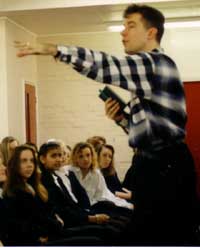
MY BEST QUALITY. I’d like to think I am loyal and trustworthy.
WORST QUALITY: Had to pick just one – but I can get discouraged extremely quickly.
WHAT THINGS MAKE YOU HAPPY?
Being with my family and mad dog, Hattie.
Doing absolutely nothing at all – I’m an expert at that.
Having a good laugh with friends.
Reading a book which is so good I am in another world completely.
Appreciating everything I have now. |
| |
READING FOR PLEASURE AND ME |
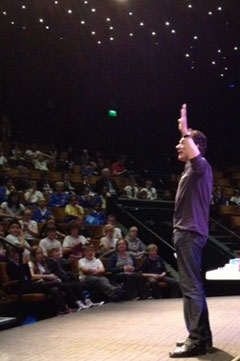 This has been my busiest autumn ever, due in no small part to three words – reading for pleasure. This has been my busiest autumn ever, due in no small part to three words – reading for pleasure.
Or as Hannah Gent, the reading manager from Woodstock Primary School in Leicester put it. ‘I have set myself the challenge of not only getting our children to read, but also to get our children to love to read.’ It’s a challenge, which cheeringly has been echoed in many other schools and libraries – with some truly incredible results.
At Woodstock Primary School, for instance, I sat in a packed hall with children and parents, as Year 5 acted out scenes from ‘My Parents Are Out of Control.’ The actors’ delight as they received highly appreciative laughs from the audience was joyous to behold.
Another exciting project I’m currently involved with is a joint scheme between Page Turners project and Chippenham Library. Here pupils selecting from a shortlist of seven titles – including, ‘How to Train Your Parents’ – will interpret the book of their choice as a performance. After a boot camp with professionals they can use drama, film, music, spoken word or any combination to present their feelings about the book. Fabulous!
Meanwhile, other schools tell me they are creating a buzz around reading by naming classes after a special author, and making that author the focus for the year with English and Guided Reading planned around a selection of their titles.
And how do I fit into all this? Well, sometimes schools want to arrange a visit. A few have even kept my appearance a secret until the last minute. Then when the pupils are told the author they have been reading is visiting us they are often incredulous. ‘Is it the real author or just an impersonator?’ one asked.
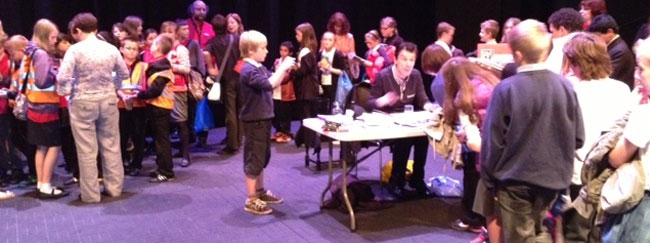 Others just want to email me some of the children’s questions. (‘Exactly how famous are you?’ one asked) or for me to send the class an ‘encouraging message.’ Others just want to email me some of the children’s questions. (‘Exactly how famous are you?’ one asked) or for me to send the class an ‘encouraging message.’
And what are my thoughts on reading for pleasure?
Firstly I greatly enjoyed formally studying books at school, in fact I have kept to this day my copies of ‘Julius Caesar,’ Pygmalion’ and ‘Short Stories of our Time’ (anyone else remember that one?) For me there was a real enjoyment in closely reading a book and afterwards feeling I really knew and appreciated it.
But I believe reading for pleasure is and has to be something quite different. And it is vital we differentiate them. This means we encourage pupils to read a book because it’s exciting or funny or spooky – but without any strings at all. In other words, they are not going to have to do any work on it. Certainly they won’t have to write a book review. (Does anything kill a delight in reading more than a compulsory book review?) We have just one aim – to help them discover how reading can unlock the door of the imagination with a greater power than anything else.
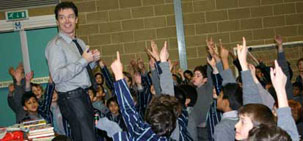 A librarian once defined a reluctant reader as ‘someone for whom we haven’t found a good enough book yet.’ I like that. And the image it paints of librarians and teachers as match makers. But this means pupils can sample a book and then say, ‘No, not for me,’ after reading only a few lines. They can go on rejecting book after book too. A librarian once defined a reluctant reader as ‘someone for whom we haven’t found a good enough book yet.’ I like that. And the image it paints of librarians and teachers as match makers. But this means pupils can sample a book and then say, ‘No, not for me,’ after reading only a few lines. They can go on rejecting book after book too.
But one day you will find you have made a match. The reader is finally hooked – and then you just have to slip away, really.
They may not even thank you but I do, on behalf of all writers. It is a small miracle really that despite all the cutbacks, library closures, and general demoralisation, teachers and librarians are more dedicated than ever to bringing children and books together. |
| |
WATCHING FILMS WITH MY DAD |
‘Oh, it’s in black and white.’ One of my friends gave a nervous gulp. ‘I don’t think I’ve ever sat through a whole black and white film before.’ She made it sound as if she was about to perform an act of supreme endurance and then added bravely, ‘But I’m sure it’ll be fine. How long did you say it lasts for?’
Two friends of mine – both in their early thirties – had never seen the classic film: ‘Casablanca.’ So I was showing them a DVD copy at my house. They both shuffled about nervously at first. Then Humphrey Bogart appeared, playing Rick, whose café in Casablanca is a centre for war refugees awaiting visas to America.
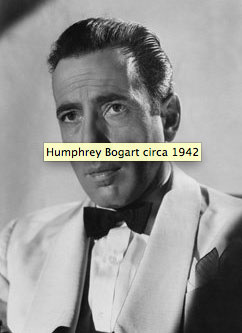 Bogart could never be mistaken for a handsome man. But his wry, cynical presence just jumped off the screen. And my friends were suddenly completely still. Bogart could never be mistaken for a handsome man. But his wry, cynical presence just jumped off the screen. And my friends were suddenly completely still.
Into Rick’s café comes Victor Laszlo (Paul Henreid) a heroic Resistance fighter, and his companion Ilsa (the hauntingly beautiful, Ingrid Bergman) who is also the love of Rick’s life. But Ilsa walked out on him – or so Rick thinks. So he certainly seems a highly unlikely person to save Victor and Ilsa, who are trapped in Casablanca …
Watching the film for the umpteenth time I remembered the very first time I saw ‘Casablanca,’ I was eleven years old and it was after midnight when it started.
Normally my parents were extremely strict about bedtimes. But an exception was made on Saturday night for that most hallowed of weekly television events: The Midnight Movie. If ever there was a film my dad thought I had to see I was allowed to stay up. Don’t forget, in the 1970s, unless you lived near a repertory cinema (and we didn’t) there was no other way to ever see films from the black and white past.
Occasionally my mum would join us but normally she went yawning off to bed leaving Dad and myself with two huge pots of tea.
The BBC announcer would be at his most chummy as he introduced ‘Our Midnight Movie,’ as if we were all members of a special club, while I did a few, extremely subtle deep breathing exercises, because the shame if I fell asleep – let alone in the middle of ‘Casablanca,’ –just could not be endured.
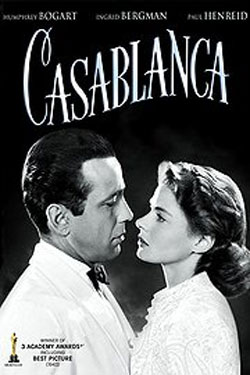 Strangely enough, watching films in black and white rather than colour never bothered me at all. In fact, it added to their strange dream-like enchantment and mystery. The black and white photography (which was frequently stunning) signalled I was in another world entirely. And I loved that. Strangely enough, watching films in black and white rather than colour never bothered me at all. In fact, it added to their strange dream-like enchantment and mystery. The black and white photography (which was frequently stunning) signalled I was in another world entirely. And I loved that.
Occasionally my dad would murmur to me the names of a supporting actor he particularly admired. And ‘Casablanca,’ was full of them: Claude Rains, Sidney Greenstreet, Peter Lorre – and I’d watch them deliver their frequently, witty lines with great panache. But generally, we watched the film in complete silence just as if we were at the cinema. Afterwards though, we’d chat animatedly for ages about what we’d seen. Sometimes we’d still be talking at three or four o’clock in the morning.
It’s become a cliché to say they don’t make films like that anymore, but like most clichés it does contain a kernel of truth. What black and white films lack in special effects and colour, they make up for in wonderful dialogue, marvellous stories and gloriously photographed stars – who often look more like gods and goddesses. And they are just crammed with scenes which never leave you.
My dad left me far too soon – when I was in my early teens. So he never knew about videos or DVDs which he’d have loved. He’d have loved too, the reaction of my friends to ‘Casablanca.,’ They were totally overwhelmed by it. ‘It’s so incredible, I even forgot it was in black and white,’ one of them said afterwards.
Today, black and white films remain for me, wholly special: instantly transporting me to those late nights when I first fell under the spell of cinema – and that’s a really happy place to be. |
WHY WRITERS SHOULD NEVER WORRY ABOUT BEING COOL
Robert Muchamore, author of the excellent ‘Cherub’ series has been explaining how modern children’s writers have to adjust to the modern world. So now when he is writing, he adapts the ‘Eastenders’ test – meaning that anything seen on the BBC Soap is acceptable in his books.
This seems a fair point but then he goes on to say how concerned he is about children’s writers often being, ‘elderly, grey-haired people on the news talking about how lovely it was to sit in a library.’ No wonder, he said, children’s writers were seen as ‘deeply uncool.’
Well, I have even worse news for Mr Muchamore. Not only are film, television and sports stars viewed as much cooler than writers. So are – and whisper this – reality television stars. In the pecking order of coolness we reside right at the very bottom.
And hooray for that, I say. As what the writer looks or sounds like is at best a distraction? It is really utterly irrelevant. All that matters is the writing. That is the only real thing.
So it is utterly irrelevant that Raymond Chandler didn’t look or act anything like his famous creation, Philip Marlow. Just read ‘The Big Sleep’ or ‘The Long Goodbye,’ that is where we meet the Raymond Chandler who matters.
Of course, like other writers I have a performing self. I am invited to festivals, bookshops, libraries etc. But I am not asked because I’m cool, (the most minor personality from ‘Made in Chelsea’ could trump me here) But because I can communicate something of the pleasure of stories. I am there to stir up an interest in reading, not give fashion tips or launch a new perfume.
One more thing – Robert Muchamore chides writers for praising libraries. Somehow that’s also ‘deeply uncool.’ Actually libraries are far more exciting places than ever before. But the point is, for many of us that is where reading first cast its spell. Why should we be ashamed of that?
And when I went through a phase, aged about twelve, of not fitting in at school or anywhere else, libraries became a refuge, a safe place to look out on the world. Today I meet children for whom it fulfils a similar purpose. The labels of ‘cool’ and ‘uncool’ have no place there. And it is as liberating for young people now, as it was for me, back then.
All that is important is that magical connection between reader and author. It doesn’t matter if the writer is grey-haired and aged or even if the author has been dead for several decades – their voice can still reach out to us.
So to fret about a writer’s perceived coolness is to miss the whole point of books.
As well as what makes them special. |
WHY BOOKS RULE
Pete answers your questions about his favourite children’s books
IS IT TRUE YOU USED TO READ SIX BOOKS A WEEK?
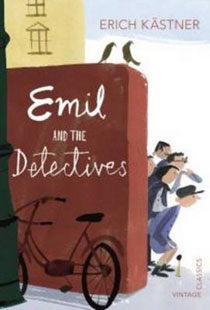 Perfectly true. When I was ten, eleven, twelve years old I’d think nothing of reading six books a week – even more during the holidays! I was a reading addict. If I didn’t have a book I’d read magazines, comics, the back of cereal packets, but I loved to be reading. Perfectly true. When I was ten, eleven, twelve years old I’d think nothing of reading six books a week – even more during the holidays! I was a reading addict. If I didn’t have a book I’d read magazines, comics, the back of cereal packets, but I loved to be reading.
HOW DID THIS LOVE OF READING START?
In my local library, I was allowed to take six books home a week and I’d spend hours choosing. That’s when I made some wonderful discoveries such as, ‘Emil and the Detectives,’ by Eric Kastner. I sat up all night devouring this thriller – funny and exciting and totally gripping. Another one I remember is ‘Charlotte Sometimes,’ by Penelope Farmer. A haunting time-travel story about a girl in a boarding school who finds herself alternating between 1918 and her own time. Both highly recommended.
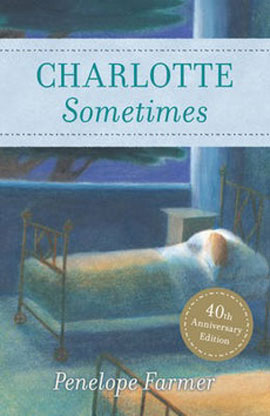 I SUPPPOSE YOU ESPECIALLY LOVED COMEDY? I SUPPPOSE YOU ESPECIALLY LOVED COMEDY?
I really did. Recently I bought – in a second hand bookshop – ‘A Bookful of Jennings,’ by Anthony Buckeridge. It was full of extracts chosen by the author from the ‘Jennings’ books and it reminded me again just how funny those books were. I also loved, ‘Just William,’ Roald Dahl, Norman Hunter’s ‘Professor Branestawm’ books and the woefully underrated Jane Shaw.
DID YOU COLLECT BOOKS?
Oh definitely. I loved seeing my sets of ‘Just William’ and Blyton’s ‘Famous Five’ and Mystery books on my shelves. If there were fifteen books in a series (as there were in the Mystery books) I had to read them all.
ARE THERE ANY OF YOUR FAVOURITE CHILDREN’S BOOKS THAT YOU WISH WERE MORE WELL-KNOWN TODAY?
So many. For instance, ‘The Family from One End Street,’ by Eve Garnett is still in print and it’s a good book. But the sequel, ‘The Further Adventures of The Family from One End Street’ is much better and the third ‘Holiday at the Dew Drop Inn,’ which is a true classic, have both vanished from the shelves. They should be re-printed at once. Also, a marvellous comic fantasy, ‘Half Magic’ (in which all your wishes only come half true) by Edward Edgar seems to have slipped away.
WAS THERE ONE BOOK WHICH INSPIRED YOU TO BECOME A WRITER?
Yes, ‘101 Dalmatians’ by Dodie Smith. I loved this book so much that I knew then that’s what I wanted to be – a writer who could conjure up such a wonderful, alternative world. I knew too, if I did not follow my dream I’d never be happy.
NO OFFENCE, BUT SOME OF MY FRIENDS THINK BOOKS ARE REALLY BORING. WHAT WOULD YOU SAY TO THEM?
I understand exactly what they are saying. Reading can become a chore, a horrible homework. So I would just ask your reluctant reader one question. Have they ever wished they were somewhere else? I know I have. Sometimes real life is just too boring and heavy. I have to escape. And books give us the power to do just that. Books give us the ability to go anywhere. And together, with the author, you invent a whole new world.
‘Ah’ but you say, ‘television and films have that power too.’ I agree they have. And I love watching them both. But with a book you have to do some of the work, (which is why you can be too tired to read but just flop down and watch the telly) It’s a totally unique collaboration. That’s why the pictures in your head are incredibly powerful. And why after reading a book the film or TV version is almost always a let-down. Aren’t I right? Books really do rule!
Reading is also brilliant fun, and you could start tonight. And who knows reading books might change your life – as it’s certainly changed mine. |
FOUR OF THE BEST BOOKS YOU’VE PROBABLY NEVER READ
THE FORTNIGHT IN SEPTEMBER
by R.C. Sherriff
Persephone Books
R.C. Sherriff is best remembered for writing the play, ‘Journey’s End’ and his time as a screenwriter in both Britain and Hollywood (‘Goodbye Mr Chips,’ ‘The Invisible Man,’ ‘The Dam Busters.’) But he also wrote a gem of a novel about the Stevens family, who all year look forward to their two weeks holiday in Bogner. A simple story but full of wonderful details, which brings this family vividly alive. A story to lose yourself in.
THE SINGING SANDS
by Josephine Tey
Random House
The Golden Age of detective stories was dominated by women (Christie, Allingham, Ngaio Marsh) and the peerless Josephine Tey. She only wrote eight novels and died far too young (in her fifties) This posthumously published book, shows Tey’s main character, Alan Grant – recovering from a breakdown in Scotland. On the train Grant stumbles upon a dead boy and a few lines of poetry about ‘the singing sands,’ which sets him off on a fascinating quest. This has all Tey’s magic and readability. I re-read it every single year.
 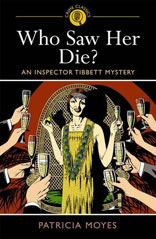 WHO SAW HER DIE WHO SAW HER DIE
By Patricia Moyes
(Arcturus Crime Classics)
One author continued The Golden Age tradition of classic deduction into the 1970s and beyond – Patricia Moyes. She wrote nineteen books about Chief Superintendent Henry Tibbett and his wife Emmy. This is one of the best. A splendid house party murder, with plenty of ingenious twists and Moyes’s glorious sense of humour. She is right up there in the Agatha Christie entertainment class. But a warning – her books are highly addictive. Once you’ve read one, you’ll want to read them all.
MARIANNE DREAMS
By Catherine Storr
Faber Childrens
Most of the children I meet during my book events have never heard of this story. That’s a great shame as it is a real classic, which has stood the test of time. (It was first published in 1958) It is the eerie story of a sick girl whose dreams became haunted by a boy in a lonely house. Then she discovers whatever she draws during the day, she will dream about at night … mysterious, exciting and marvellously haunting. One of those rare stories that never leaves you. |
WHY I LOVE FUNNY BOOKS THE BEST OF ALL
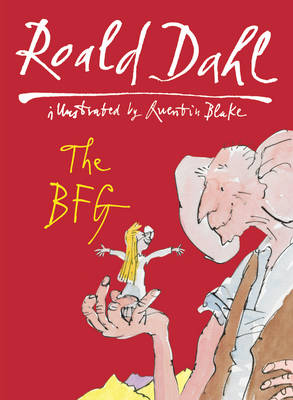 If stories are a kind of magic and I believe they are, then some books could be described as magic tricks. We avidly turn the pages to find out what really happened or who the murderer is If stories are a kind of magic and I believe they are, then some books could be described as magic tricks. We avidly turn the pages to find out what really happened or who the murderer is
Funny books rarely work like that. They may have – as in Anthony Buckeridge’s ‘Jennings’ books, or P.G.Wodehouse’s ‘Jeeves’ stories – wonderfully farcical plots but that is not the main reason we read them.
No, what casts a spell over us are voices, so eloquent and funny I can hear them in my head as I write this. Some of my earliest memories are ‘hearing’ A.A. Milne’s Eeyore, Piglet and Tigger and Roald Dahl’s ‘BFG’ and Richmal Crompton’s ‘Just William.’ Their words and their characters just bounced off the page and into my head.
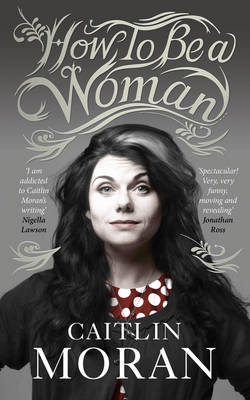 That is why more than any other genre characters from comic novels become like friends. We may admire heroic, action figures, even wish to emulate them. But we ‘know’ Adrian Mole, and Cassandra from ‘I Capture a Castle,’ and Gerald Durrell’s family from ’My Family and Other Animals.’ Comedy is merciless at exposing characters’ pretensions and weaknesses and we love them all the more for it. That is why more than any other genre characters from comic novels become like friends. We may admire heroic, action figures, even wish to emulate them. But we ‘know’ Adrian Mole, and Cassandra from ‘I Capture a Castle,’ and Gerald Durrell’s family from ’My Family and Other Animals.’ Comedy is merciless at exposing characters’ pretensions and weaknesses and we love them all the more for it.
Comic writing, also I believe, tells us more about an era than anything else. So, if for instance, someone wanted to know what life in the early 1980s was really like, I cannot think of a better guide than Sue Townsend’s Adrian Moles books. In the same way Joe Dunthorpe’s laugh out loud ‘Submarine’ and Caitlin Moran’s hilarious and stirring ‘How to be a Woman,’ illuminate life today in a unique way.
But what makes funny books really special is the way they never leave us. Some stories belong keenly to us while we are reading them, but once we’ve discovered the amazing plot revelation we rarely, if ever, wish to return. I have just been re-reading ‘The Code of the Woosters’ by P.G.Wodehouse for the umpteenth time. I know every twist and turn of the plot but it still pulls me in, makes me laugh. I feel when I’m reading this that I’m home.
Funny books are like that. They beguile us from our earliest years. They become our cure for depression or world-weariness. Our perfect comfort books. Yet they also remind us of the heartbreaking frustrations and glorious silliness of everyday life. We’re all, at heart, comic characters.
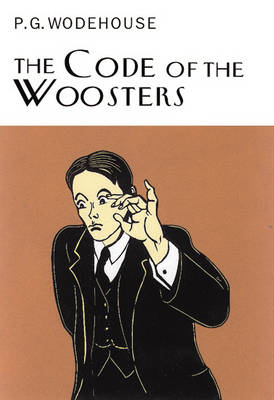 Finally, it is always wonderful to discover someone who shares your love of a favourite author. But to find someone who shares your enthusiasm for a humorous writer is to make a very special connection. Finally, it is always wonderful to discover someone who shares your love of a favourite author. But to find someone who shares your enthusiasm for a humorous writer is to make a very special connection.
Perhaps because the funny books we love most tells more about us than anything else.
FAVOURITE FUNNY AUTHORS: FROM MY CHILDHOOD . . .
Richmal Crompton (Just William) Dodie Smith, Anthony Buckeridge (Jennings) Norman Hunter (Professor Bransestawn) P.G.Wodehouse, Jane Shaw (Susan) Gerald Durrell, Roald Dahl.
FAVOURITE FUNNY AUTHORS: CONTEMPORARY CHILDREN’S . . .
Philip Ardagh (Eddie Dickens) Anthony Horowitz (Groosham Grange) Paul Jennings, Louise Rennison, Marcus Sedgewick, Jamie Thomson (Dark Lord), Bali Rai (Dream On,) Hilary McKay, Andy Stainton. Helena Pielichaty, John Green and Philip Pullman (I was a Rat). |
ALL ABOUT EMBARRASSING PARENTS
By Pete Johnson
One of a parent’s most important jobs is to be embarrassing. They display special ability at this, when their offspring are aged between eleven and sixteen.
My own parents certainly showed real expertise here. Mum, for instance, would loudly ask if I’d started my homework yet – when some of my mates were listening! She never appreciated that doing homework was deeply uncool, so could only be done behind closed doors in total secret. While my dad would shout at me to switch that rubbish down when I was listening to the charts with friends. He had no understanding of the vital importance – indeed necessity – of hearing it at full volume.
At least though, such misunderstandings helped to separate my parents’ world from my own. Flash forward to today and parents are far more understanding, and far more prepared to engage with teen culture – and it’s driving their children absolutely crazy.
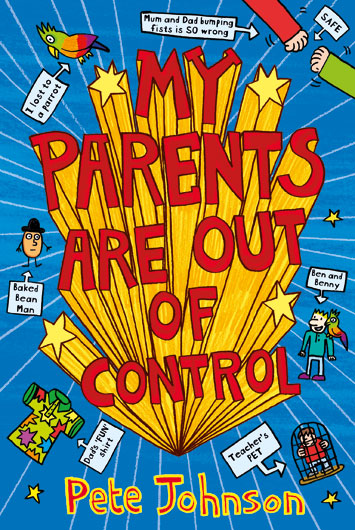 I’ve explored this in ‘My Parents Are Out Of Control,’ a stand alone sequel to my international best seller, ‘How to Train your Parents,’ (now translated into twenty-four languages) This was the first book to deal with hyper-parenting and for the sequel I wanted to come up with another strong theme. I’ve explored this in ‘My Parents Are Out Of Control,’ a stand alone sequel to my international best seller, ‘How to Train your Parents,’ (now translated into twenty-four languages) This was the first book to deal with hyper-parenting and for the sequel I wanted to come up with another strong theme.
The idea came to me right out of the blue. My niece, Zoe, was moaning about her dad. ‘He promised he wouldn’t talk to my friends in the car,’ she wailed, ‘but he not only did that, he told three jokes, and no one laughed, except him.’
Now my dad would never have spoken to my friends beyond a curt ‘Good evening.’ He certainly wouldn’t ever have told jokes. Yet Zoe said she’d much prefer an old school, silent dad than the modern joke-telling, ‘down with the kids’ one.’ That got me thinking.
And over the next few weeks I began researching all the new ways parents have found to embarrass their kids. The young people I spoke to complained loudly about parents who insisted on touching fists with their mates, dressed in clothes far too young for them, tried to ‘friend’ them on ‘Facebook’ and used words like ‘sick,’ ‘safe’ and ‘wicked.’
Not one of them was pleased parents were staying in touch and acting young. They wanted them out of their world and off to garden centres and pub quizzes.
Next I interviewed some parents, they said they weren’t deliberately trying to act young. They were just acting naturally. And anyway, they didn’t consider ‘forty five’ old anymore. I have to say I don’t either. So I was very split in my sympathies. And as I wrote this book I often started arguing with myself. For instance, if a forty-five year old man wants to buy a baseball cap and wear it round the wrong way, why shouldn’t he? He’s not harming anyone – just having fun. Ah yes, but if you’re a parent, you have responsibilities and one of those is not causing your teenage son or daughter unnecessary embarrassment. (Your mere existence is embarrassing enough!) So you have to restrain yourself for their sake. Or do you?
‘My Parents Are Out Of Control,’ is full of these clashes and misunderstandings, notably when Dad, having learnt all the latest ‘young words’ starts using them when he is picking Louis up from a school disco. ‘Yo everyone, hope you had a wicked time. But I’m looking for my blood,’ he declares outside the school gates. And he when he spots Louis he shouts, ‘Hope you’ve been having fun with your homies.’ Louis immediately thinks, ‘My dad is going off his onion, right in front of my entire school.’
While his dad thinks, ‘I’ve just proved, there doesn’t have to be this great gap between the generations. If you have the right attitude and keep up with the latest wicked words, you can slip right back, can’t you?’
Or can you?
I’ve never researched a topic which has aroused such interest. Many of my interviews took place in schools and after the session was over impassioned pupils would stay on through their lunch break telling me something else ‘you must put in your story.’ I knew then I was really on to something.
And I hope all my interviewees will be pleased with the result, and ‘My Parents Are Out Of Control,’ makes them – and their parents – laugh. As I discovered with ‘How to Train your Parents,’ stories are a great way to get the generations talking and laughing together.
I’m looking forward to sharing this new story with them. |
Pete lists his seven favourite books from childhood
These are the seven favourite books from my childhood. My criteria has been simple: I just picked the seven books which meant the most of me. They are in no particular order.
 WILLIAM THE PIRATE: Richmal Crompton WILLIAM THE PIRATE: Richmal Crompton
I discovered the William books first in my local library. I was immediately drawn to the wonderfully, fat hardbacks with those super illustrations (by Thomas Henry) And so William Brown just bounced into my life one day and really, he’s never left it. From the start I loved his energy, his opinions, his rants and his glorious self-belief. William was in no doubt that ‘stachoos’ would be put up to him one day.
There are thirty-eight William books – all well worth reading. But although the first book ‘Just William’ is the most famous, I don’t think it’s one of the very best. If someone were meeting William for the first time I’d recommend: ‘William the Pirate.’ And there is one story in the collection: ‘William and the Princess Goldilocks,’ which would be my nomination for the best ever William story. It’s a perfect farce, full of glorious misunderstandings. Then read Mrs Bott’s Hat,’ and ‘The New Neighbour,’ – I guarantee they will make you a fan for life.
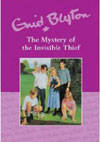 THE MYSTERY OF THE INVISIBLE THIEF: Enid Blyton THE MYSTERY OF THE INVISIBLE THIEF: Enid Blyton
Everyone read Enid Blyton when I was growing up. In fact, I was first introduced to her, by a friend in the playground – a little tribute to Blyton’s power, which I think she would have appreciated I (She wrote. ‘I never listen to any critic over the age of twelve.’)
Of course I loved all the Famous Five books and the other series too: especially the ‘Barney’ books. But my favourites were always the ‘Mystery’ books – partly because the character of Fatty is one of Blyton’s very best; vain, important a total show-off, yet essentially good hearted. And partly because I loved the mystery element of the stories – gathering clues, etc. There is also more fun and energy in these books than any others.
As Duncan McLaren wrote. ‘Joy runs through the ‘Mystery’ books like a river.’ They show Blyton at her most relaxed and cheeky – the children really do tease P.G.Goon (another great character) unmercifully. I picked this book because I think it’s got an especially good mystery. But all the ‘Mystery’ books are great, except for the very last one. ‘Mystery of the Banshee Towers,’ which was written after Blyton had been quite ill – and just doesn’t have the magic of the others.
 HOLIDAY AT DEW DROP INN: Eve Garnett HOLIDAY AT DEW DROP INN: Eve Garnett
In 1937 Eve Garnett won the Carnegie medal for ‘The Family at One End Street,’ a landmark book detailing the life of a dustman and his wife, and their seven children. It’s still a vivid and vital read but I always liked the sequel better, as this is where Kate – my favourite character, and her brother and sister go down with Measles and are sent on a convalescent holiday to the Dew Drop Inn in the country. There they are looked after by Mrs Wildgoose – surely the kindest landlady ever. In the third One End Book, ‘Holiday at the Dew Drop Inn,’ Kate goes back to the Dew Drop Inn on her own, and the whole book is devoted to her and her adventures there.
This is such a naturally funny book and it is packed with wonderful observations and great characters. A fascinating portrait too of a vanished world. It is shocking that it is currently out of print. It is well worth tracking down.
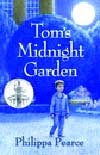 TOM’S MIDNIGHT GARDEN: Philippa Pearce TOM’S MIDNIGHT GARDEN: Philippa Pearce
This story just fascinated me when I first read it. Tom is sent to stay with his uncle and aunt. One night he hears the clock strike thirteen: wanders outside and finds another world, another time and a girl name Hatty. The ending is one of the best I’ve ever read. I love time shift stories.
Two other favourites were: ‘Charlotte Sometimes’ by Penelope Farmer and ‘A Traveller in Time,’ by Alison Uttley.
 SUSAN INTERFERES: Jane Shaw SUSAN INTERFERES: Jane Shaw
My sister, Linda introduced me to the Susan-series. And although I never shared her enthusiasm for pony books or girls boarding school tales, I loved these because of their bubbly sense of fun.
Susan and her cousins Midge, Bill and Charlotte are vividly drawn, with lots of banter. Susan, being well-meaning but very interfering. In this, the best of the Susan books, they go to Switzerland, with a requested gift of a mysterious packet of tea. But is the tea as innocent as it seems? Clearly not. Soon all sorts of wild adventures take place. But the holiday itself is also described so well. This story is great fun by a much underrated writer.
 THE WITCHES: Roald Dahl THE WITCHES: Roald Dahl
In the early 1980s I heard Roald Dahl read aloud from his stories at the National Theatre. It was fabulous – he read his stories with wonderful vigour. But the highlight was the end when he produced a tatty old notebook and read the opening pages from a story which he hadn’t finished yet. For me this was the best of all. The opening just carried you into the tale rightaway.
The story was later published as ‘The Witches.’ And it’s still my favourite Dahl: fast-paced, exciting, very funny and yet sad and rather wise as well. A perfect children’s book.
 101 DALMATIANS: Dodie Smith 101 DALMATIANS: Dodie Smith
This is quite simply a masterpiece and the book which inspired me to write to the author, Dodie Smith, when I was eight. It was the beginning of a long and for me, richly, rewarding correspondence. Even though it was dogs – not children – who were really Dodie’s first love. In fact, she wanted to call ‘101 Dalmatians’ a novel for dogs, but the publishers talked her out of it.
It’s an exciting tale, with wonderfully, likeable characters and, of course, one of the greatest villains ever: Cruella de Vil. There is a sequel: ‘The Starlight Barking,’ a totally different book to the first one but which I also like. And Dodie wrote too: ‘I Capture the Castle,’ another masterpiece … and very late in her life: ‘The Midnight Kittens,’ a charming book which deserves to be better known. |
P.G. WODEHOUSE FOR TEENAGERS
So it’s all over for P.G. Wodehouse.
Well, according to A.A. Gill, in The Sunday Times, it is. He claims no one is reading Wodehouse anymore except for a few people in hospital (‘good recuperation reading for the elderly.’) And certainly no one young ever goes near them. Wodehouse is just too mannered and daft for their taste.
Well, to quote John O’Hara, ‘I don’t have to believe that if I don’t want to,’ and I don’t.
Especially as I first read Wodehouse when I was twelve (an old battered copy of ‘Stiff Upper Lip Jeeves,’) and have gone on reading him ever since. Later I introduced Wodehouse to a few friends – who admittedly were like me, somewhat precocious. They quickly too became Wodehouse fanatics.
We started reading about Jeeves and Bertie Wooster, around the same time as we discovered Sherlock Holmes. These were worlds we loved visiting. And we were held in thrall by Wodehouse’s fiendishly complicated plots and dazzling use of language. But most of all it was his authorial voice which so bewitched us.
It’s not much fun being an adolescent. I spent most of my time feeling confused and very unsure of myself. (So I later discovered, as did practically everyone else) Wodehouse was like the benign, urbane, witty eccentric uncle I’d always wanted.
I’ve never liked or needed Wodehouse more than when I was in my early teens. And it’s my belief teenagers today need that healing, humorous voice more than ever.
But care must be taken to introduce teenagers to the right book. Even to a twelve year old sophisticate like myself, Blandings was a little beyond me. I wasn’t ready. No, begin with Jeeves and I would suggest starting with Wodehouse’s most rollicking action-packed Jeeves novel ’Joy in the Morning,’ which has chapters ending like this.
‘I saw that Wes Nooke had gone up in Flames.’
‘It gave me quite a start.’
Then maybe move on to some of the Jeeves short stories and when ready, approach Blandings via the novella, ‘Crime Wave at Blandings’ one of the most perfect pieces of humorous writing I’ve ever read.
Wodeshouse inspired – and still inspires me. But most of all he helped me get through those years when I was at my most uncertain and unhappy.
I just refuse to believe Wodehouse’s time with teenagers – and the rest of us – is over. |
MY TIPS ON HOW TO WRITE
A HORROR STORY
Facing the blank page. Is this the part you dread most? Well, you are not alone. So does every other single writer.
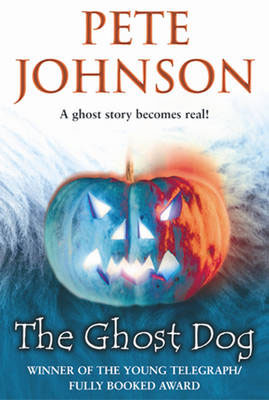 WHAT’S THE BEST WAY TO GET STARTED? WHAT’S THE BEST WAY TO GET STARTED?
My suggestion – Warm up first.
Each day I start off by scribbling down notes, half sentences, maybe a couple of lines of dialogue. It doesn’t matter, but the great thing is I have begun.
WARM UP EXERCISE
Jot down FIVE spooky sounds. For instance:
How about a sudden scream?
A wail?
A yell for help?
What about animal noises?
Have sounds ever scared you?
And then you might think about when you heard a particular noise. For instance, a cough might not sound very frightening. But how about, though, if you were alone in a house late at night when you suddenly heard a cough erupt out of the darkness?
Now you are also thinking about setting. So next imagine you are running through a churchyard at night. What might you see, hear and smell? This leads you to a vital ingredient of any horror story.
ATMOSPHERE.
So the more vividly you can picture your setting – whether it’s an isolated house or an eerily silent wood – the scarier your story will become.
A TIP
Weather can really help to build up atmosphere.
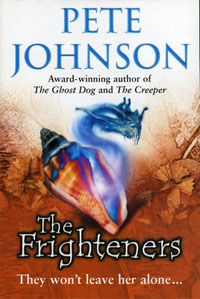 Think for instance, of a morning covered in thick fog or one of those winter afternoons when it turns dark all at once. Think for instance, of a morning covered in thick fog or one of those winter afternoons when it turns dark all at once.
ANOTHER TIP
You do not have to write your story chronologically. You can have what I call a ‘trailer opening.’ This is when you begin in the middle or even at the end of your story. You pull the reader in right away because it is so dramatic and exciting.
EXAMPLE
‘The first time I only saw its face.
It had evil red eyes.
Blood poured out of its mouth.
It was the ugliest, most horrible thing I had ever seen.
And I’d brought it to life.’
These are the opening lines of my book, ‘THE GHOST DOG,’ hopefully grabbing your attention right away. The Ghost Dog doesn’t appear then for more than twenty pages, but I’ve given you a strong hint of the horror waiting for you.
MORE READING
I also used the trailer idea in ‘THE FRIGHTENERS.’ See also the opening to the first of the Twilight books.
|
WHY DANCING IN THE LIBRARY SHOULD BE ENCOURAGED – NOT CONDEMNED.
So St Hilda’s College at Oxford has fired a librarian because students recorded a Harlem Shake video in her library. But why? The librarian didn’t join in (though why shouldn’t she?) she just let students who are facing the bleakest job prospects in modern times have a bit of fun – when the library was empty at night.
But fun has become such a doubtful, suspect word today. It just doesn’t fit with our grim, bossy times. Never have we been lectured more than today. Even sitting in an over-priced train means we have to endure a constant barrage of improving messages (‘You must remember to take all your belongings with you.’ ‘You must study the safety notes,’ etc, etc)
Oliver Cromwell would be proud to live in such a joyless, sanctimonious age. How we got here I do not know. But I do despair at how a sense of humour – which means a sense of proportion – is fast disappearing from public life.
The sacking also creates completely the wrong image of librarians. I’ve just finished a great series of events with Staffordshire Libraries. And the librarians were especially keen to counter their ‘Ssh, don’t talk, try and breathe more quietly’ image. Libraries can be – and frequently are – fun and lively places today. Which of course makes for a really positive learning environment.
Personally I think that librarian should be reinstated right away and then given a promotion. As she understands that in these austere times we all need opportunities to escape. Reading, dancing, making music, they’re all in the end creative ways of transcending the greyness of modern Britain. |
I WANT TO BE A WRITER: What tips can you give me?
Pete answers your questions:
WHAT’S THE HARDEST THING ABOUT BEING A WRITER?
For me it’s always gaining that first idea for a story. Such ideas rarely pop into your head. Usually you have hints and little glimpses of something but need to keep digging away. And sometimes they completely fall apart. Of course when an idea does take off there’s no feeling like it. You just feel so excited and exhilarated and can’t wait to start.
IS IT TRUE YOU SHOULD WRITE ABOUT WHAT YOU KNOW?
I’d say it’s partly true. I think it’s a good idea to begin with a situation you know well. It might be a favourite place or memory. But after that, let your imagination take over and have fun. You should never ever feel limited to just your experiences. Writers often take wild leaps of imagination.
HOW DO YOU MAKE YOUR STORIES LAST SO LONG? I RUN OUT OF IDEAS AFTER A COUPLE OF PAGES.
The secret is to always begin with the characters. You are meeting them for the first time. So try and find out as much as you can about them. A really key question to ask is what does your character most want. What is their dream? It’s worth really thinking about this as this takes you right to the heart of your character.
I WANT TO BE A WRITER. WHAT TIPS CAN YOU GIVE ME?
Firstly, find a regular time each week when you will just write. For me it was Sunday mornings. And no matter what happens or how you feel, you will always write then. Some weeks you might feel inspired, others it might be much tougher. That doesn’t matter. Just get into the writing habit.
Next, remember every single professional writer re-writes. A good tip is to put aside something you’ve written for a while and then read it as if you’ve never seen it before. I make little notes in the margin (Too confusing, needs more work, etc.)
Finally, have fun with your writing. Don’t make it serious. The best ideas often come when you’re playing with a scene or a situation.
IS WRITING BEST LEARNT BY READING?
Yes, read as widely as you can. Notice how writers start stories, such as beginning right in the action (I did this in my book ‘Traitor’ and ‘The Vampire Hunters.’) Look too at how we end chapters to keep your eyes glued to the page. I want to write a book you can’t put down.
Reading widely inspires you but also gives you the confidence to write your own stories. |
HOW LIBRARIES ARE BETTER THAN EVER
Libraries changed my life.
Joining the library was like finding myself in a vast, intoxicating treasure trove.
For one glorious hour Mum would leave my sister, Linda and myself under the kindly eye of the librarian, while we decided which six books each we’d be taking home.
I seemed to spend most of my childhood and early adolescence feeling awkward and ill at ease. Often I’d try and hide that awkwardness by making up a joke off the back of something someone had said two minutes previously. But I never felt I quite belonged anywhere except in my local library. Here I could be myself, perhaps because I was totally absorbed in my quest. Libraries were both my refuge and my window on to the world.
Sometimes I’d find books which would make me look afresh at the precarious, amazing world around me. Other times I’d pick a story just because it made me start laughing on the first page. If it hadn’t been for libraries I wouldn’t have made all these life-enhancing discoveries or decided being a writer must be the best job in the whole world.
But does such keen personal interest weaken my defence of libraries today? Aren’t I just luxuriating in nostalgia? Well here’s the thing – wonderful as libraries were in my childhood, they’re even more exciting and dynamic places today. One recent example.
In December I visited Abraham Guest Academy in Wigan. Back in July as part of a scheme to raise literacy levels the headmaster decided to buy every Year 6 pupil moving up to the school a free book to read over the summer and then base a project on it.
But which book? The school consulted Hayley Waddicor, the school library team leader from the public library. She showed amazing good taste (!) by recommending my book ‘Trust me I’m a Troublemaker.’ This made such an impact I was invited to the school in December as a Christmas treat for the pupils (eat your heart out Father Christmas!)
The events took place in the school but for the book-signings we went back to the public library. It was buzzing with pupils who obviously felt completely at ease there. Many of them greeting the librarian by name before asking if the books they’d ordered were in yet or when the next discussion group was taking place (Chatterbooks, as they’re often called, takes place in libraries around the country now and are regularly over-subscribed)
Others leapt on to the computers to look up more info about me (‘I never knew you wrote ‘Pirate Brother,’ I loved that book when I was younger. I got it free in a cereal packet.’) Later some pupils told me they did their homework in this library every single night.
Of course people from other age groups were in and out of the library too. And I really liked all these generations mingling so easily together (Where else does that happen?) But most of all I saw how that sense of belonging I’d experienced glows just as keenly in libraries today. Only now it isn’t confined to a small group of eager readers. Libraries are engaging more pupils than ever. And everyone knows this it seems – except for our local politicians.
So here’s an idea, let’s have a day when local councillors all over the country are strongly encouraged (!) to visit their local library. Then they can see what we know already.
Of course I am a beneficiary of libraries. So I want their cultural legacy to go on. But I’m not writing this out of misty-eyed remembrance. I visit libraries all over the country and see that today, more than ever, they are right at the centre of people’s lives.
I do appreciate though how libraries are an easy target. But to destroy them would be to lose something very precious which can never be replaced. |
WHAT READING FOR PLEASURE MEANS TO ME
It had been one of the worst days of my life – and at the end of it I’d never felt happier.
I’d changed schools and just discovered the curriculum was quite different. That’s why I’d got my worst ever Maths result (I’ll whisper it, four per cent) I’d never felt more ashamed – or humiliated.
The school day ended with ‘quiet reading.’ Not a very inspiring name perhaps, but it meant for forty glorious minutes you were left completely alone with your book.
So I sat there, with the sun streaming through the windows completely absorbed in the final pages of ‘I Capture the Castle’ by Dodie Smith. I was so locked into the story that when I finished I forgot where I was for a few seconds. The ending is still one of the best I’ve ever read.
But here’s the vital thing. Reading that book not only helped me escape a horrible day – in fact it gave me a kind of transcendence over it. It also helped me make sense of things. I didn’t feel so weighed down by my own problems anymore. It was as if I’d just returned from a long voyage and could look at my life quite differently now.
It also made me think what a wonderful thing it must me to write books. I so wanted to try and do that. A feeling that just would not go away!
Of course we also studied set texts in lessons. But for me, that felt quite different to being able to read anything I chose. For one lesson a week I was granted the power to go anywhere. And I didn’t have to do anything with the book I chose either, like write a review. There were no strings. This lesson was just (just!) about the magic of reading.
To lose reading for pleasure from the school week is to greatly impoverish future generations.
It must not be allowed to happen.
Readers Unite. |
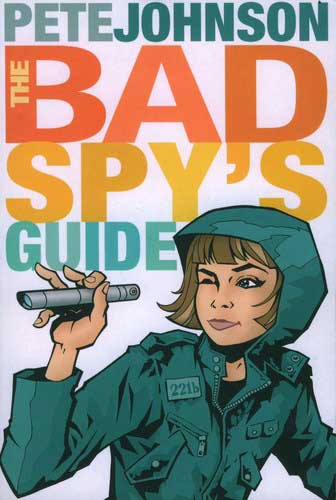 PAUL TEMPLE AND THE CENTENARY WHICH THE BBC FORGOT PAUL TEMPLE AND THE CENTENARY WHICH THE BBC FORGOT
Francis Durbridge was one of the most popular thriller writers of the twentieth century.
He wrote over thirty books, but is best remembered for a whole series of twisty, gripping serials on BBC (‘Melissa,’ ‘The Doll’ etc) and for creating radio’s greatest detective, Paul Temple.
Paul Temple was a writer of detective stories who was also an amateur sleuth, regularly called in by Scotland Yard when they were faced with situations too complicated for them to deal with.
For over thirty years Paul and his wife, Steve, were loved throughout the land and it was not hard to see why. They were very likeable characters and were brilliantly portrayed by Peter Coke and Marjorie Westbury.
In recent years Paul and Steve gained an army of new fans thanks to their regular revivals on Radio Four Extra – and became huge best-sellers when they were launched on CD.
Francis Durbridge died in 1998, so knew nothing of the huge revival of interest in his creations. But Pete Coke, as urbane and charming off-air as on, did and I was lucky enough to have corresponded with him for several years.
And November 25th 2012 saw the centenary of the birth of Francis Durbridge. So what special tributes have the BBC broadcast to this remarkable writer, who had such a long and highly successful association with them?
The shocking answer is absolutely nothing.
While the celebrations for other anniversaries seem to be never-ending (James Bond for instance) Francis Durbridge didn’t even merit a mention on Radio four Extra.
So this website is extremely proud to lead the celebrations instead. And if you’ve never listened to Paul and Steve Temple serial what a treat you’ve got in store. I’d recommend starting with the CDs of ‘Paul Temple and the Conrad Case,’ and ‘Paul Temple and the Alex Affair.’
I also dedicated one of my books to Pete Coke, ‘The Bad Spy’s Guide’ which tried to recapture something of the spirit of those radio shows, which millions will never forget – even if the BBC has. |
| |
| Exclusive to this website: HAPPY HALLOWEEN, a short story by Pete Johnson |
It’s Halloween: the spookiest night of the year. And I’m doing a dare: the one no one else wants to do. But I’m the new boy. And I’ve got to prove myself.
‘You knock on the door,’ this boy says, ‘and a really scary-looking guy will answer. You shout out: "Mr Mason, I know your secret. You’re a mad magician who puts spells on people. You’re also very ugly: Happy Halloween." You can run for your life then.’
The boys watch me slowly walk up to Mr Mason’s house.
I ring on the doorbell.
‘Good luck,’ whispers a voice. ‘You’ll need it.’
The door rattles and opens. Mr Mason glares down at me. I shout out everything I’ve been told to say. ‘Happy Halloween,’ I end.
Suddenly Mr Mason’s hand springs forward and pulls me inside. I hear the boys gasp.
Then I start to shake with laughter. I know Mr Mason – or my mum does. He’s her great uncle. But they’d lost touch for years.
Last night I told him about the dare. He just put back his head and laughed. ‘Of course I’ll play along,’ he said. He even suggested pulling me into the house.
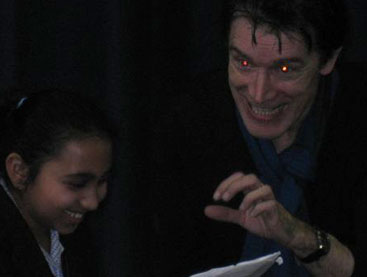 I can see your friends hiding outside,’ he says, laughing again. He’s so cheerful. How can he have got such a bad reputation? I can see your friends hiding outside,’ he says, laughing again. He’s so cheerful. How can he have got such a bad reputation?
‘When this is over,’ I say, ‘I will tell my friends what you are really like.’
‘Shall we play another little joke on your friends?’ he asks. He brings out a vampire mask. ‘I found this in the loft, why don’t you try it on?’
It fits perfectly.
‘This’ll give your friends a shock,’ he says.
I stagger outside. I shout, ‘He’s turned me into a vampire.’
The boys’ faces bob up. But they are so horrified they can’t speak. They all run away.
A shiver runs through me. It’s starting to get cold. A bird shrieks making me jump. I’ve had enough of jokes at Halloween. I try and pull off the mask. I cannot move it.
I see Mr Mason glide towards me. ‘Will you help me?’ I begin.
He shakes his head. ‘I’m afraid your friends are right – I do put spells on people. And that mask doesn’t come off … ever.’ He starts to laugh again. ‘Happy Halloween.’ |
| |
| |
| PETE'S OCCASIONAL BLOG |
COMEDY SECRETS - Or why writing comedy scares me
|
Now here’s a question I’m often asked. ‘What’s the toughest part of writing a story?
The answer, for me, is starting it.
I dread that part, but especially when it’s a comedy. That really scares me. I’d rather go into a room full of blood-crazed vampires than write the first page of a funny story. No, honestly.
Here’s why.
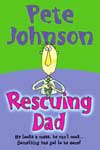 My first pages (in fact, my first drafts) are usually really, really bad. And I become convinced no one will laugh at a single word and I want to run away. But even very, very bad drafts are better than nothing. The story is beginning to take shape. My first pages (in fact, my first drafts) are usually really, really bad. And I become convinced no one will laugh at a single word and I want to run away. But even very, very bad drafts are better than nothing. The story is beginning to take shape.
And I’ve learnt the secret of writing comedy is simply this – never try and be funny. That kills all your laughs instantly. Comedy has to feel effortless, natural as if it’s just bubbling up from the story.
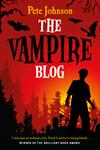 So in the early drafts I never think about the humour. I concentrate on the characters, and try and find some sort of bond with them. I let them talk for pages and pages – much of which I will never finally use. I often ask them what they’d most like to happen and what their dreams are. So in the early drafts I never think about the humour. I concentrate on the characters, and try and find some sort of bond with them. I let them talk for pages and pages – much of which I will never finally use. I often ask them what they’d most like to happen and what their dreams are.
This helps when I’m building a situation which will really challenge them. It could be something real and serious – Joe and Claire discovering their parents are separating in ‘Rescuing Dad.’ Or Marcus finding out he’s about to change into a half-vampire in ‘The Vampire Blog.’
 Or maybe my character finds themselves a lone voice, like Spencer holding out against turning into a teenager in the ‘(Un)Teenager’ books, or Louis fighting his parents when they try to control his every move in ‘How to Train Your Parents.’ Or maybe my character finds themselves a lone voice, like Spencer holding out against turning into a teenager in the ‘(Un)Teenager’ books, or Louis fighting his parents when they try to control his every move in ‘How to Train Your Parents.’
What I also love is the clash of two sparky, highly contrasting characters like Marcus and Tallulah in the Vampire books and Archie and Miranda in ‘Trust me, I’m a Troublemaker.’
Some days I’ll just sit back and let the characters do the work. Those are the best bits of writing when it all seems to be going on inside your head and 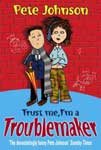 you’re not doing anything at all except jot down what’s happening. you’re not doing anything at all except jot down what’s happening.
I do enjoy it when a story is practically finished and I’m just polishing. That’s a vital phase though. And sometimes it involves cutting. Comedy needs economy, and tightening to really shine.
And do I ever laugh at my own stories?
Sometimes, when I hear them on audio tape, read more skilfully than I could ever manage. Then I think that’s pretty funny. How on earth did I ever manage to write that?
And will I ever be able to write anything as funny again? |
|
THE PETE JOHNSON QUESTIONNAIRE ABOUT WRITING …
 WHEN DID YOU FIRST START TO WRITE AND WHY? WHEN DID YOU FIRST START TO WRITE AND WHY?
I wrote a fan letter to Dodie Smith, the author of 101 Dalmatians. She wrote back and was the first person to put into my head the idea of being a writer. A few years later I started entering writing competitions and I won ten pounds. Wow! But it got me started.
WHAT WOULD YOUR ADVICE BE FOR BUDDING AUTHORS?
- Always carry a notebook with you and try to jot down in it every day. It could be a snatch of conversation, an idea for a story, whatever you feel like writing.
- Ideas for stories rarely come fully-formed. You might only receive the glimmer of something first of all. But don’t give you. Keep thinking about your idea. You’ll surprised how things can slowly grow in your mind.
- Some days just have fun playing with ideas, characters and styles. Writing is often about discovery and exploration. So allow yourself time to experiment.
DO YOU REALLY CARRY A LITTLE NOTEBOOK EVERYWHERE YOU GO?
Yes, much to the annoyance of my friends. For you never know when you’re going to get a brilliant idea or hear something you’ve got to write down. Real life is always interesting – and that’s where all the stories begin.
WHERE DO YOU WRITE YOUR BOOKS?
I have a study, which has big windows, bright posters on the walls and masses of books lurking about. Everyone who goes into it says it has a very happy atmosphere. So it’s ideal for writing.
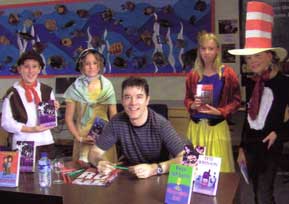 DO YOU EVER GET WRITER’S BLOCK? DO YOU EVER GET WRITER’S BLOCK?
Yes I do sometimes. What I have learnt is that you get writer’s block for two reasons. A scene can be really, really hard, in which case it is probably not right. Other times you can get writer’s block if you try too hard. In a funny way, with writing you have to let the ideas come to you, you can’t force them. Your unconscious doesn’t work office hours. If I get writer’s block then I just go for a long walk and get some fresh air and exercise.
DO YOU HAVE AN AGENT?
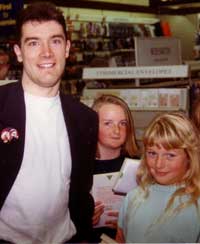 Yes, a super agent – Jennifer Luithlen: Jennifer Luithlen Agency. I would recommend all writers to have an agent. They are an invaluable ally. Yes, a super agent – Jennifer Luithlen: Jennifer Luithlen Agency. I would recommend all writers to have an agent. They are an invaluable ally.
WHAT COMES FIRST FOR YOU, PLOT, PLACE OR CHARACTERS – AND WHY?
Always the idea. But ideas rarely come fully formed. They have to be wooed. I got the idea for, ‘How to Train Your Parents,’ after my nephews’ School Sports day. And ‘Rescuing Dad,’ after a book signing session. I spent days letting the idea dance around in my head and then I begin thinking about characters.
WHAT IS YOUR IDEA OF WRITING HEAVEN … AND WRITING HELL?
Writing Heaven are those days when the character’s voice is so strong in your head, it’s as if the story is being dictated to you. Writing Hell is when you’re writing a comedy and feel dull, flat and not the least bit funny.
WHICH NEW(ISH) WRITER HAVE YOU MOST ENJOYED LATELY?
David Nicholls – ‘ONE DAY’ a brilliant romantic comedy. |
Fancy a light-hearted
quiz all about Pete
and his books?
Click here!
USEFUL LINKS
"Interview with a Reading
Champion – Pete Johnson"
on National Literacy Trust
"Words for life" website
ACHUKA author profile
Sheffield Children's Book Award
|
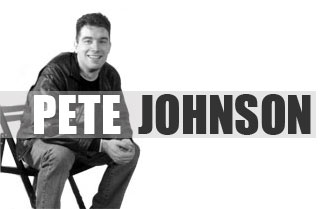


 Malcolm Saville was, after Enid Blyton, the biggest selling adventure story writer of his era. He is best known for his Lone Pine series, in which a group of children pledge to ‘be true to each other, whatever happens.’ My favourite Lone Pine adventure was, ‘Seven White Gates,’ (Girls Gone By) and re-reading this yarn has been a joy. The story just sweeps you along and it is packed with moonlight treks and life saving exploits (including an incredibly tense cable car finale) There are also some wonderful descriptions of the Shropshire countryside, as well as suitably detailed descriptions of mouth watering meals (always the sign of a great children’s book) It also has an unexpectedly moving finale – Saville at his very best.
Malcolm Saville was, after Enid Blyton, the biggest selling adventure story writer of his era. He is best known for his Lone Pine series, in which a group of children pledge to ‘be true to each other, whatever happens.’ My favourite Lone Pine adventure was, ‘Seven White Gates,’ (Girls Gone By) and re-reading this yarn has been a joy. The story just sweeps you along and it is packed with moonlight treks and life saving exploits (including an incredibly tense cable car finale) There are also some wonderful descriptions of the Shropshire countryside, as well as suitably detailed descriptions of mouth watering meals (always the sign of a great children’s book) It also has an unexpectedly moving finale – Saville at his very best. This is the sixth and final book about Penny, an unusual heroine, because she is shy and very unsure of herself. Her nervous, cautious character rang all sorts of bells for me. And I found myself cheering her on, as over the series, she begins to develop in confidence and resilience. She is aided by her reckless friend John, who becomes her cheerleader (and is a brilliantly drawn character)
This is the sixth and final book about Penny, an unusual heroine, because she is shy and very unsure of herself. Her nervous, cautious character rang all sorts of bells for me. And I found myself cheering her on, as over the series, she begins to develop in confidence and resilience. She is aided by her reckless friend John, who becomes her cheerleader (and is a brilliantly drawn character) Now over half a century since those heady days Hayley Mills has written her memoir of that time, ‘Forever Young.’ This it is one of those rare books you can’t stop reading – affectionate and warm hearted (in true Pollyanna style she focuses on ‘glad things’) yet highly perceptive and honest too – not least about her first and fairly disastrous marriage to a man, over thirty years older than herself (the film director Roy Boulting) This is a book you find yourself still thinking about long after you have read it and could well be my autobiography of the year!
Now over half a century since those heady days Hayley Mills has written her memoir of that time, ‘Forever Young.’ This it is one of those rare books you can’t stop reading – affectionate and warm hearted (in true Pollyanna style she focuses on ‘glad things’) yet highly perceptive and honest too – not least about her first and fairly disastrous marriage to a man, over thirty years older than herself (the film director Roy Boulting) This is a book you find yourself still thinking about long after you have read it and could well be my autobiography of the year!  I would also recommend one of his later books, ‘The Undetective.’ (Moonstone) a brilliantly ingenious story about a mystery writer who writes under a pseudonym to protect the source of his insider knowledge about the police (his brother in law) His police procedural novel becomes a huge success but then things start to spin out of control – and he finds himself drawn into a real-life murder. Graeme keep us guessing just what is going on until the last pages with a fab final twist. It is also frequently very funny – notably with its satirical look at the publishing world.
I would also recommend one of his later books, ‘The Undetective.’ (Moonstone) a brilliantly ingenious story about a mystery writer who writes under a pseudonym to protect the source of his insider knowledge about the police (his brother in law) His police procedural novel becomes a huge success but then things start to spin out of control – and he finds himself drawn into a real-life murder. Graeme keep us guessing just what is going on until the last pages with a fab final twist. It is also frequently very funny – notably with its satirical look at the publishing world. 





 This has been my busiest autumn ever, due in no small part to three words – reading for pleasure.
This has been my busiest autumn ever, due in no small part to three words – reading for pleasure. Others just want to email me some of the children’s questions. (‘Exactly how famous are you?’ one asked) or for me to send the class an ‘encouraging message.’
Others just want to email me some of the children’s questions. (‘Exactly how famous are you?’ one asked) or for me to send the class an ‘encouraging message.’ A librarian once defined a reluctant reader as ‘someone for whom we haven’t found a good enough book yet.’ I like that. And the image it paints of librarians and teachers as match makers. But this means pupils can sample a book and then say, ‘No, not for me,’ after reading only a few lines. They can go on rejecting book after book too.
A librarian once defined a reluctant reader as ‘someone for whom we haven’t found a good enough book yet.’ I like that. And the image it paints of librarians and teachers as match makers. But this means pupils can sample a book and then say, ‘No, not for me,’ after reading only a few lines. They can go on rejecting book after book too.  Bogart could never be mistaken for a handsome man. But his wry, cynical presence just jumped off the screen. And my friends were suddenly completely still.
Bogart could never be mistaken for a handsome man. But his wry, cynical presence just jumped off the screen. And my friends were suddenly completely still. Strangely enough, watching films in black and white rather than colour never bothered me at all. In fact, it added to their strange dream-like enchantment and mystery. The black and white photography (which was frequently stunning) signalled I was in another world entirely. And I loved that.
Strangely enough, watching films in black and white rather than colour never bothered me at all. In fact, it added to their strange dream-like enchantment and mystery. The black and white photography (which was frequently stunning) signalled I was in another world entirely. And I loved that.



 If stories are a kind of magic and I believe they are, then some books could be described as magic tricks. We avidly turn the pages to find out what really happened or who the murderer is
If stories are a kind of magic and I believe they are, then some books could be described as magic tricks. We avidly turn the pages to find out what really happened or who the murderer is That is why more than any other genre characters from comic novels become like friends. We may admire heroic, action figures, even wish to emulate them. But we ‘know’ Adrian Mole, and Cassandra from ‘I Capture a Castle,’ and Gerald Durrell’s family from ’My Family and Other Animals.’ Comedy is merciless at exposing characters’ pretensions and weaknesses and we love them all the more for it.
That is why more than any other genre characters from comic novels become like friends. We may admire heroic, action figures, even wish to emulate them. But we ‘know’ Adrian Mole, and Cassandra from ‘I Capture a Castle,’ and Gerald Durrell’s family from ’My Family and Other Animals.’ Comedy is merciless at exposing characters’ pretensions and weaknesses and we love them all the more for it. Finally, it is always wonderful to discover someone who shares your love of a favourite author. But to find someone who shares your enthusiasm for a humorous writer is to make a very special connection.
Finally, it is always wonderful to discover someone who shares your love of a favourite author. But to find someone who shares your enthusiasm for a humorous writer is to make a very special connection.
 WILLIAM THE PIRATE: Richmal Crompton
WILLIAM THE PIRATE: Richmal Crompton THE MYSTERY OF THE INVISIBLE THIEF: Enid Blyton
THE MYSTERY OF THE INVISIBLE THIEF: Enid Blyton HOLIDAY AT DEW DROP INN: Eve Garnett
HOLIDAY AT DEW DROP INN: Eve Garnett TOM’S MIDNIGHT GARDEN: Philippa Pearce
TOM’S MIDNIGHT GARDEN: Philippa Pearce SUSAN INTERFERES: Jane Shaw
SUSAN INTERFERES: Jane Shaw THE WITCHES: Roald Dahl
THE WITCHES: Roald Dahl 101 DALMATIANS: Dodie Smith
101 DALMATIANS: Dodie Smith
 Think for instance, of a morning covered in thick fog or one of those winter afternoons when it turns dark all at once.
Think for instance, of a morning covered in thick fog or one of those winter afternoons when it turns dark all at once.
 I can see your friends hiding outside,’ he says, laughing again. He’s so cheerful. How can he have got such a bad reputation?
I can see your friends hiding outside,’ he says, laughing again. He’s so cheerful. How can he have got such a bad reputation?






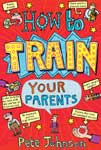 Sample three of his most popular titles:
Sample three of his most popular titles:
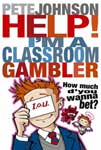 HELP! I’M A CLASSROOM GAMBLER
HELP! I’M A CLASSROOM GAMBLER